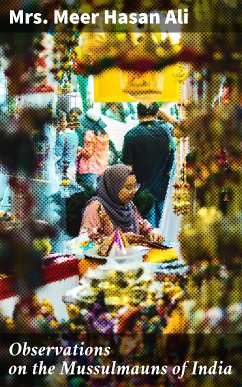In "Observations on the Mussulmauns of India," Mrs. Meer Hasan Ali presents a poignant exploration of the social, cultural, and religious dimensions of Indian Muslims during the 19th century. Written in a richly descriptive and accessible prose style, the book combines personal anecdotes with thorough ethnographic observations, allowing readers to engage deeply with the varied lives of Muslim communities in India. This work serves as both a historical document and a social commentary, reflective of the complexities within Indian society at the time, making it an indispensable contribution to the field of South Asian studies. Mrs. Meer Hasan Ali, a pioneering female voice in a male-dominated literary landscape, drew her insights from a life spent in a culturally rich milieu. Her unique perspective as a Muslim woman writing about her community offers an intimate understanding that transcends the more common narratives of her time. Ali'Äôs staunch advocacy for education and social reform underscores her motivation to illuminate the rich heritage and struggles of Muslims in India, elevating her work to a profound ideological platform. This book is highly recommended for scholars, students, and general readers interested in the intersections of gender, religion, and culture within the South Asian context. Mrs. Meer Hasan Ali's observations resonate with themes of identity and tradition, providing an invaluable lens through which to view the dynamic tapestry of 19th-century Indian society.
Dieser Download kann aus rechtlichen Gründen nur mit Rechnungsadresse in A, B, BG, CY, CZ, D, DK, EW, E, FIN, F, GR, H, IRL, I, LT, L, LR, M, NL, PL, P, R, S, SLO, SK ausgeliefert werden.









